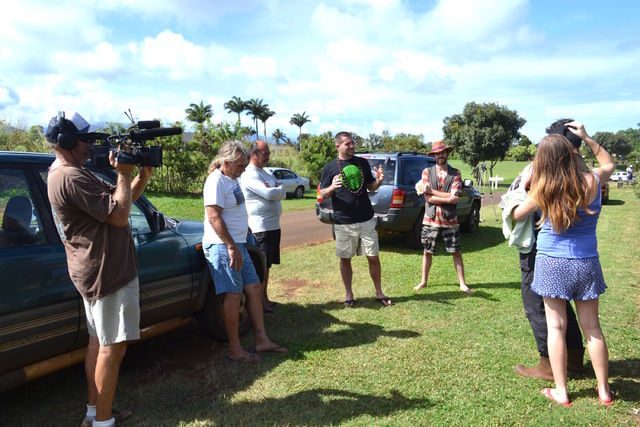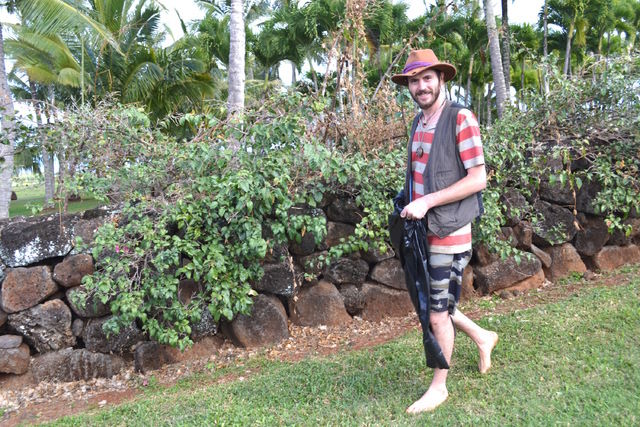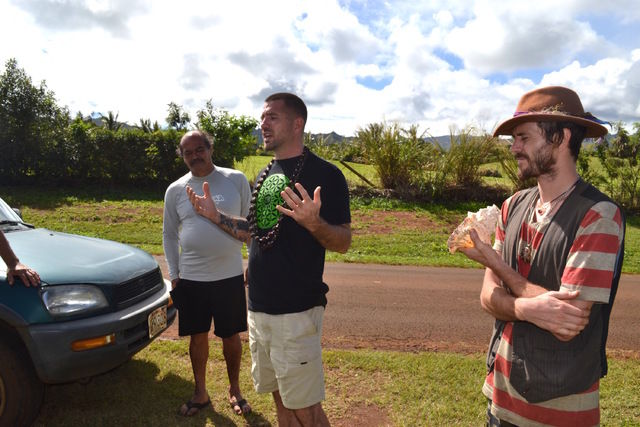MOLOAA — Instead of the hundreds of protesters that were expected to march along Mark Zuckerberg’s wall Saturday, only about 10 gathered in solidarity. “The march is about Zuckerberg to know about the social, environmental and economical things that he’s
MOLOAA — Instead of the hundreds of protesters that were expected to march along Mark Zuckerberg’s wall Saturday, only about 10 gathered in solidarity.
“The march is about Zuckerberg to know about the social, environmental and economical things that he’s doing down here,” said Joe Hart, a Moloaa kenaf farmer and the march’s organizer. “We would like to see him come out, discuss these issues and hear him say what his intentions are. Give us a commitment that you’re not trying to cut off the access path.”
After Hart and kuleana land heir Joseph Kamai gave a brief talk to the small crowd, the protesters marched from the south-end entrance of Zuckerberg’s estate along Koolau Road to the north end of the Facebook owner’s wall, picking up trash along the way.
“We have a reef that’s dying. We have a landfill that’s three times the allowable limit,” Hart said. “We would like to see Mr. Zuckerberg have a town hall meeting. He should start right here on Moloaa, Kauai.”
On Friday, in a letter to The Garden Island, Zuckerberg expressed regret for filing eight quiet title actions for about a dozen parcels of kuleana land on his 700-acre estate.
“To find a better path forward, we are dropping our quiet title actions and will work together with the community on a new approach,” he wrote. “We understand that for native Hawaiians, kuleana are sacred and the quiet title process can be difficult. We want to make this right, talk with the community, and find a better approach.”
As of Saturday, however, Moloaa resident Hope Kallai and other neighbors of Zuckerberg said they haven’t heard from him or his representatives.
“Since we’ve never been able to talk to him, and you only go through a layer of lawyers, I’m hoping that this will bring an opportunity for communication: face to face,” Kallai said. “He needs to know who we are. His vision and our vision have to meld because we’re here and he’s here. We all aren’t going to leave.”
One of the major problems is beach access through his property, Kallai said.
“We need Mr. Zuckerberg to know that people hike the coast and they go from Moloaa to Kilauea often,” she said. “With global sea rise, there’s places on this property that you can’t boulder hop safely. You’re in the splash zone. We really need to talk about this. I don’t know if he knows our beach access laws that gives us the right to lateral safe passage along the coast.”
The parcels in question emerged during land reforms that the Kingdom of Hawaii pursued in the 1800s called “the Great Mahele.” Until then, no individual owned land — it was collectively cared for and used.
The reforms allowed commoners to claim title to land they lived on and farmed, usually about a half-acre.
But only a small share of Hawaii’s land — some 28,000 acres — ended up in the hands of commoners. Millions of acres went to the king, other royals and the government.
In the decades afterward, large sections of land passed into the hands of sugar plantation owners. The plantations, and other landowners who purchased the properties after sugar growing became unprofitable, frequently used the quiet title process to buy out descendants of the commoner families, whose land was interspersed among the larger holdings.
Kilauea Sugar Co. previously owned Zuckerberg’s land.
Joseph Kamai, an heir of Kamehameha III, has been protesting for the right to use a historic trail for access to camping and gathering resources for over two decades.
“I’ve been fighting for the Alaloa Trail for a long time,” Kamai said. “The thing is, (Zuckerberg and Priscilla Chan) need to understand: They can’t block a historical trail. This is exactly what they’re doing.”
Kamai said Zuckerberg should stop fighting the people who own that land and work with them instead.
“I want him to give the rights to the people who have the kuleana land on top of his land,” he said. “Just let them have the little piece that they want. Our tutu, Kamehameha III, made it to where it was a one-third, one-third, one-third interest to all of our people: commoners, alii and alii nui. We all have interest in all the land.”
In 2014, Zuckerberg purchased 700 acres of Kilauea land for about $100 million. The Pilaa Beach property, which consists of about 390 acres, was bought from Pflueger Properties, a partnership owned by island auto magnate James Pflueger. The other piece of land, Kahuaina Plantation, is 357 acres of a former sugar cane plantation.
In the letter, Zuckerberg said he and his wife wish to preserve the land from major development, and large portions of the land will be maintained for farming by the community.
“We are committed to being good stewards of this beautiful land,” he wrote. “We hope to build a home for our family here.”
•••
The Associated Press contributed to this story.




